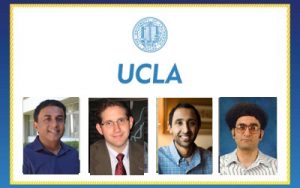
Computer scientists at UCLA and USC have received a four-year, $1,999,404 research grant from the National Science Foundation to create a new field called Network Design Automation (NDA) that seeks to create Computer Aided Design (CAD) tools for networks. When we use Amazon, Facebook or Office365, we access a world of rich services via a network. Network reliability is crucial because downtime affects productivity, economic output, and social communication. Networks have gone from being a ‘nice to have’ to a must-have, like electricity.
Unfortunately, networks today are designed and maintained by a patchwork of inadequate and ad hoc tools. The grant seeks to address this need, inspired by Electronic Design Automation (EDA), a billion dollar industry that underpins the $100B chip industry and a vibrant intellectual discipline in its own right.
The grant is led by George Varghese, Chancellor’s professor of computer science at UCLA. During a four year stint at Microsoft Research, Varghese and colleagues were able to set in place a more principled approach to the reliability of Azure, Microsoft’s large cloud (https://www.microsoft.com/en-us/research/blog/hyperscale-cloud-reliability-and-the-art-of-organic-collaboration/). Concurrently, co-PIs Todd Millstein, a computer science professor at UCLA and Ramesh Govindan at USC had begun a collaboration that applied programming languages ideas to networks, an effort that led to a widely used open-source tool called Batfish. When Varghese joined UCLA, the trio joined forces. They were later joined by co-PIs Yuval Tamir and Ravi Netravali at UCLA, and Barath Raghavan at USC.
While Govindan and Varghese focus on networks, Millstein brings expertise in Programming Languages and Tamir and Netravali provide expertise in systems. Tamir seeks to bring ideas from design for debugging and testing in chips to networks, while Netravali will attempt to harness the power of Natural Language Processing to convert operational logs to actionable intelligence. Raghavan’s emphasis is on tools for networks in the developing world, in an attempt to democratize network tools beyond large vendors such as Google and Microsoft.
Together the researchers are attempting an ambitious multi-disciplinary approach to creating a set of tools that they hope will be indispensable for designing and operating networks in the future.
